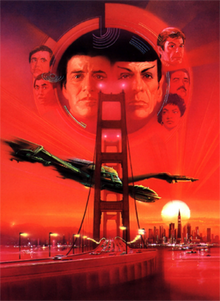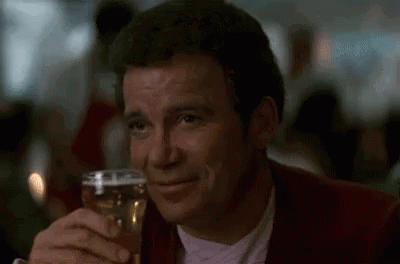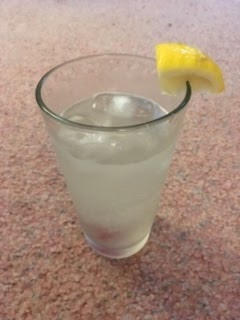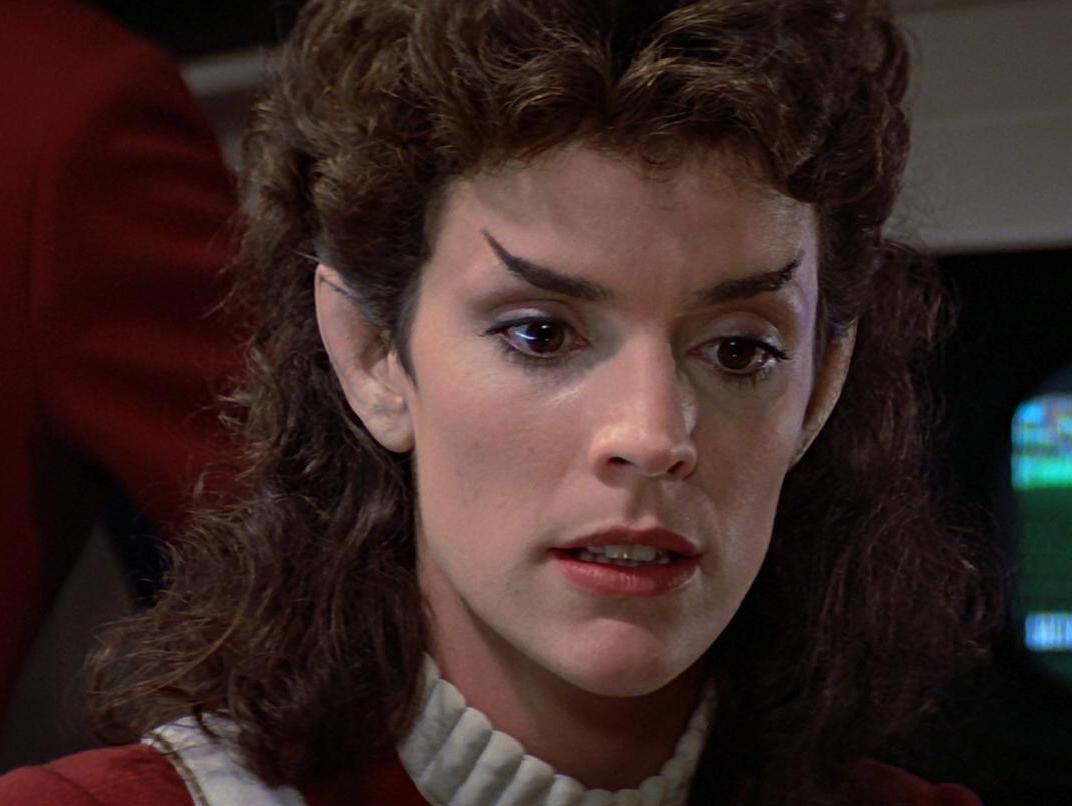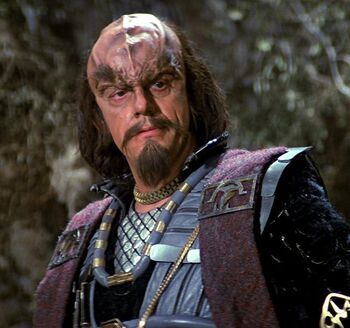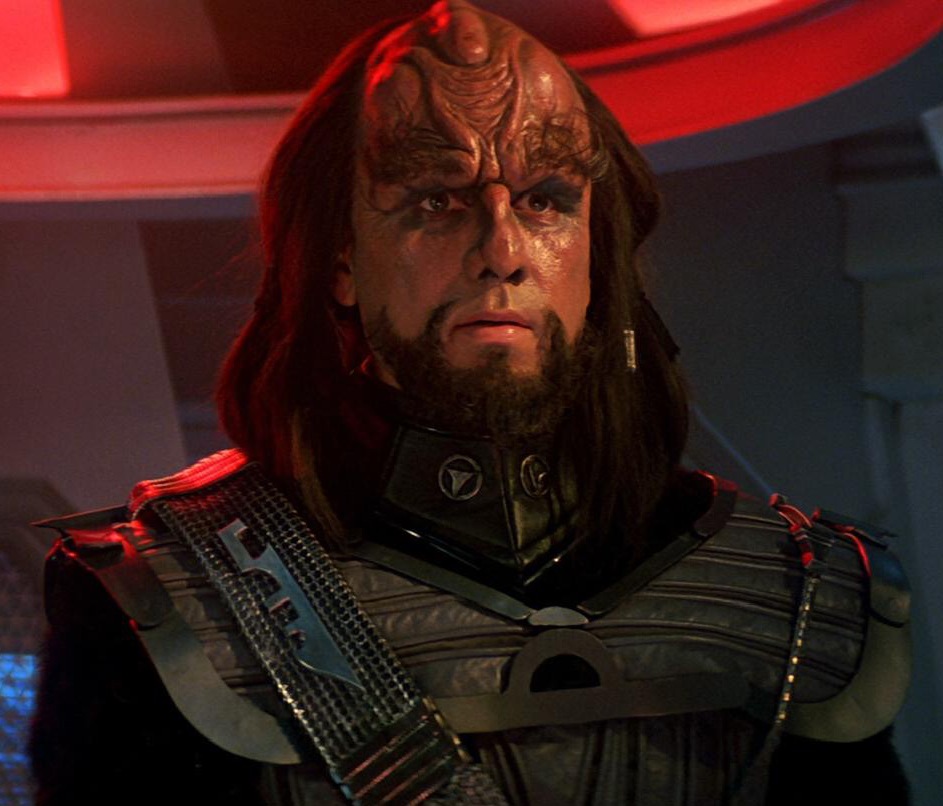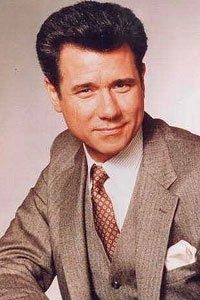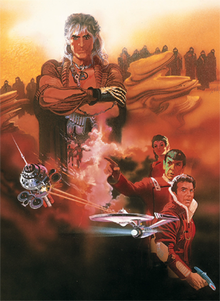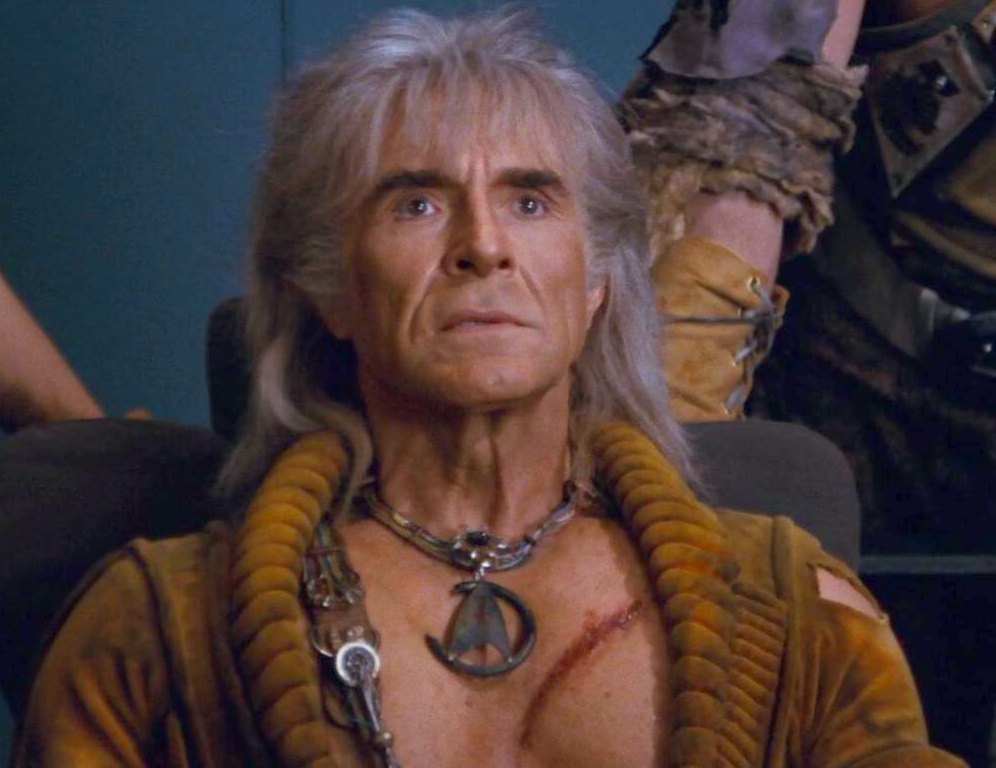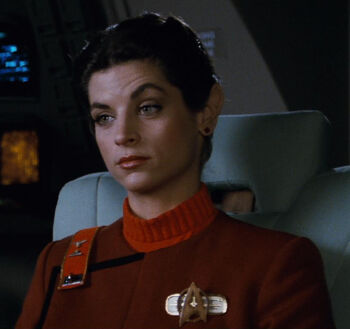Series: Star Trek: The Next Generation
Season 1, Episodes 1 and 2 (initially presented together as a single installment)
Original Air Date: September 28, 1987
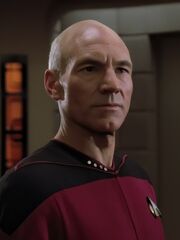 |
| via Memory Alpha |
But of course, there's a complication. An omnipotent being identifying himself as Q (John de Lancie) invades the bridge, declaring humanity put on trial for its worthiness as a species. Meanwhile, we start to get the sense that not all is as it seems on Deneb IV. The Bandi have established a resort world where wishes are granted practically the instant they are imagined. Perhaps the fantasy is too good to be true.
There's an awful lot of new for the faithful to assimilate in this pilot episode but the links to the original series (TOS) are rock solid. Gene Roddenberry was back at the creative helm and he brought on franchise veteran D.C. Fontana to write the script. Q descends from Trelane in TOS Season 1's "The Squire of Gothos." The idea of a wish-giving vacation planet gone awry originates in "Shore Leave." The seemingly new holodeck has a predecessor in the animated series (TAS), Season 2's "The Practical Joker." The idea of humanity on trial is one clearly meaningful to Roddenberry as the franchise returns to it a lot. TOS's "The Savage Curtain" and TAS's "The Magicks of Megas-tu" are notable early examples. So, in terms of narrative, we're on terra firma. But what about all of these new characters? Can the Star Trek concept survive beyond the originals?
You know how sometimes when you're in a new place - college, for instance - your brain starts pairing the new people you're meeting with the more familiar people from your past? Mine does that occasionally and I've observed others doing it, too. Even now with a new student, I'll identify him/her as one of an archetype. How about we play that game with Next Generation (TNG) characters as they might have descended from their TOS predecessors? For the purposes of the exercise, I'll stick with what we know from this one episode. It's limiting on the one hand but also simplifying in light of the development we all know is coming for some of the new kids. Please note, I am focusing more on narrative role than position on the ship. I will admit upfront that my own choices are imperfect and in many ways the imperfections are the very elements which will eventually make TNG the more interesting series (gasp!). Obviously, I welcome discussion and debate. Let's play...
Kirk = Picard
This one seems obvious. Captain becomes Captain. But almost immediately, we begin to see Picard as a different sort of leader from Kirk. Yes, he's confident but there's something more quiet and personable about the way he interacts with his charges. He's more vulnerable, too. We learn in his first meeting with Riker of his discomfort with children, for instance. If anything, Riker is more Kirk-like in terms of personality. But Picard is ultimately the story's main protagonist and thus he is Kirk's successor.
Spock = Data
The TOS model requires a voice for logic to advise the captain and Data's our man! Well, android. However, in important ways, Data (Brent Spiner) is Spock's exact opposite. Whereas Spock runs screaming from the emotional weakness of his human side, Data wants desperately to be more like a human. Riker even makes a Pinocchio joke in this first episode.
McCoy = Troi (ha, it rhymes)
On the other side, we need an advocate for emotion and ship's counselor Deanna Troi (Marina Sirtis) is the best fit. In fact, of all the comparisons here, she is the easiest match. She's nowhere near as cranky as the good doctor and her empathic abilities make her even better suited to this narrative purpose. Sadly, she does lack the extraordinary eyebrows.
Scotty = Tasha
After TOS's Big 3, this game gets a lot trickier and the problem is clear. As with most television series, it took a while for TNG to find its footing. But the one area where it kicked TOS's butt from the first night onward is character development. Perhaps it will be some time before we develop comparable attachments to any of these newbies as we already have with Kirk, Spock and Bones but the players further down the bench quickly outpace their counterparts on the older show. Scotty's the perfect example. The Scottish accent is just adorable but what's the point of Scotty really? What purpose does he supply beyond occasional panic?
Loyalty. Above all else, Scotty is fiercely loyal to his ship and to his captain. I was ready to stick Riker in this slot until Tasha Yar's impassioned testimony at the trial. Her devotion to the cause of the Federation is a clear driver for the character. But again, courtesy of said testimony, we already know more about Tasha (Denise Crosby) than we ever learned about Scotty through two series and four movies.
Yes, I know what's coming. It will require some juggling of this concept. Stay tuned.
Uhura = Dr. Crusher
This one's easier, the easiest of the down-ballot contests. The actress Nichelle Nichols loved Uhura for her occasional sensual femininity. I will go a step further and assert that she is the most human of all TOS's characters, certainly on the second tier. I believe it's the TOS episode "Charlie X" that contains a wonderful scene between Uhura and Kirk. In a high stress moment, Kirk snaps at Uhura and she snaps right back. In the midst of the crisis, the two of them stare at each other for a beat, then both apologize, quite sincerely. It is a wonderfully genuine, tender exchange. For a precious instant, the friendship supersedes all other responsibilities. In "Encounter at Farpoint," we already see capacity for the same between Picard and Crusher (Gates McFadden). Vicariously, Uhura finally gets the development she's always deserved.
Sulu = Geordi La Forge
With Sulu, we have even less to go on than with Scotty. Perhaps it's more meaningful to go back to the original casting of the character. The choice of an Asian actor (George Takei) for Sulu was not accidental. By 1966, the United States had been at war in East Asia for the better part of a quarter-century. An Asian face on the Enterprise crew was intended to be just as meaningful as an African one. What's more, while Takei himself has always insisted on a broader Asian presentation for the character, the Japanese-American identity of the actor is not without significance. In TOS's "Balance of Terror," there is a shot of Sulu when Spock's physical similarities to the Romulans' are exposed. Perhaps it is unintentional but I have always sensed an extra message in that shot. Takei spent part of his childhood in Japanese-American internment camps and the parallels with that chapter of history and the Spock/Romulan story are unmistakable to me.
Who better to offer comparable symbolism in a new series than a Black American actor? What's more, LeVar Burton was not just any Black actor. He was the most recognizable member of the new cast for his role as the slave Kunta Kinte in Roots, one of the most heralded mini-series in television history. Geordi's development already exceeds Sulu's and it's only going to get better. Stay tuned.
Chekov = Worf
Chekov, in turn, offers even less than Sulu. In this comparison, it's the portrayal of the character as Russian that matters. The 1960s were the depths of the Cold War. The Soviets were the clear adversary of the Americans. Having a Russian comrade (small c) on the crew in a more peaceful future was a deliberate gesture. Before TNG, the Klingons were still the enemy of the Federation. Seeing a Klingon serving on the Enterprise bridge was downright gasp-inducing. As with everyone else, there's a lot more to come for Worf, including a particularly interesting dynamic to develop between him and Riker. Stay tuned.
That takes us to the end of the primary TOS roll call, yet there are still a couple left on the TNG side. Wouldn't you know it, the TNG bench is both stronger AND deeper.
First, the matter of Will Riker. Obviously, he's essential to the new story, the actor given second-billing right after Stewart. As noted above, I see elements of both Kirk and Scotty in Will. There's even some of the playboy that was originally intended to be a bigger part of the Chekov character. Ultimately, Riker proves a more dynamic figure than any of them - yes, Kirk included. While he does not have a clear predecessor on the original show, I do see a legacy in the movies...
Willard Decker = William Riker
Oddly enough, while watching The Motion Picture for my recent post, I thought it would have been nice to have more development for the Will Decker character. In a funny way, we got it in the form of Will Riker. Similar first names. Similar last names. Comparably handsome. Virtually identical reunion scenes with Ilia and Deanna respectively. Most importantly for the long term, the same sense of responsibility in challenging authority.
Finally, Wesley Crusher (Wil Wheaton). The too-often maligned Wesley. As I have written before, if there's one thing I feel Trek handles more poorly than time travel, it's stories about children. Wesley is often perceived as a weak point, especially in TNG's early going. It's not the actor's fault. I love Wil Wheaton. For me, he will always be Gordy (Stand by Me). It's the writers' fault. I've long suspected that Picard's discomfort with children is a projection of similar anxieties for those behind the scenes. But I'm veering off topic...
I don't believe there is a kid-in-the-candy-store equivalent in Trek before Wesley. I would be very interested if anyone can suggest one. Roddenberry saw the boy as a reflection of his own 14-year-old self, though the producer willingly conceded that he was never as smart as Wesley. So, for the sake of the exercise...
Gene Roddenberry = Wesley Crusher
Music Notes
For the opening and closing theme, Jerry Goldsmith's theme for The Motion Picture was resurrected. The rest of the episode is scored by Dennis McCarthy. McCarthy made frequent use of an eight-note theme composed by Alexander Courage to represent the Enterprise. He also recycled a piece he'd originally composed for the TV program V for Q's courtroom entrance music.
Acting Notes
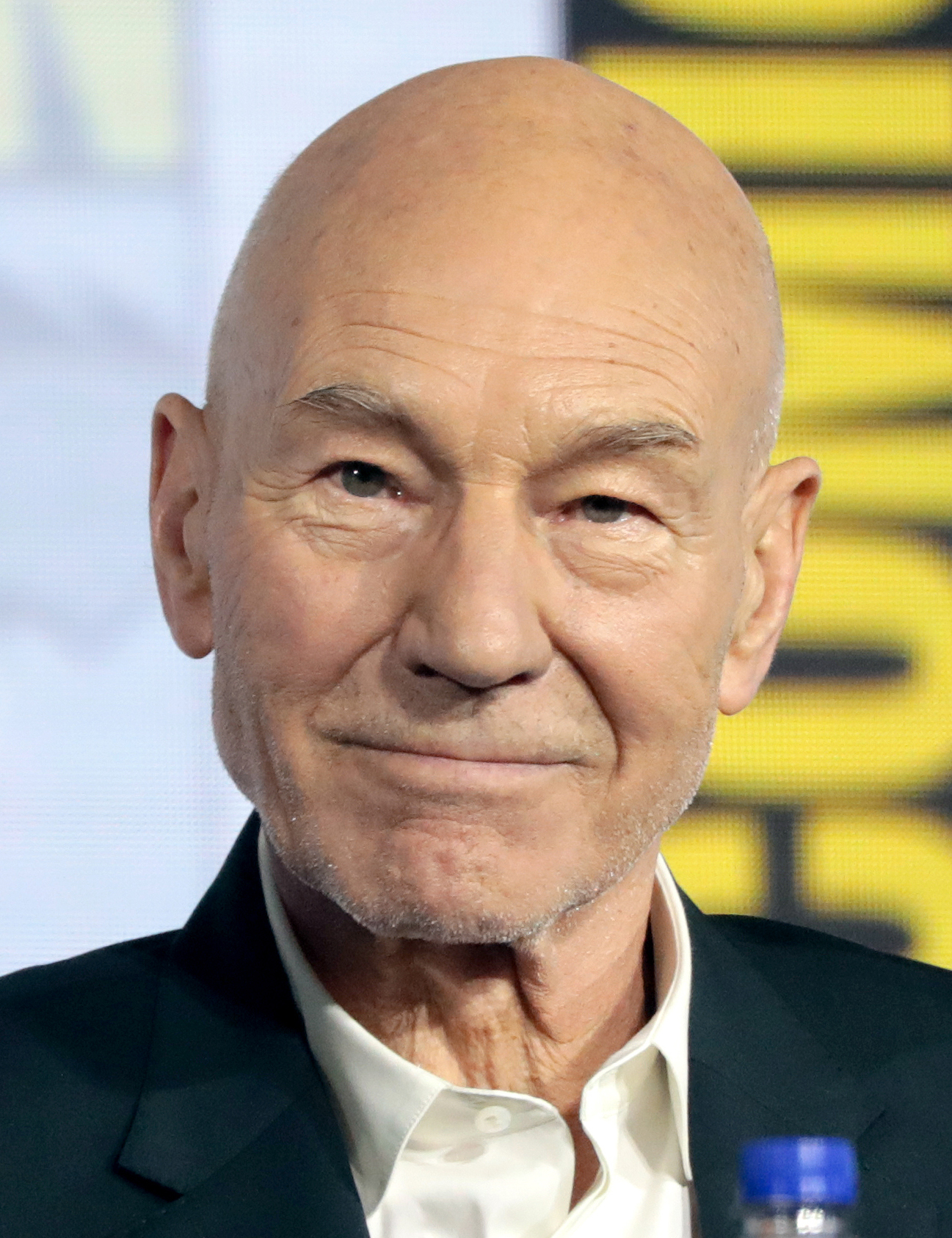 |
| via Wikipedia |
Patrick Stewart was a serious acting upgrade for Star Trek. Even though he was a virtual unknown in the United States when he was cast in the role of Captain Picard, he already had a stellar resume in the UK, especially on the stage. He'd spent 16 years with the Royal Shakespeare Company, including an Olivier Award-winning performance in Anthony and Cleopatra (he won a second Olivier post-Trek). When he took the Picard role, he was living out of a suitcase in Hollywood, neither he nor his agents believing the show would last - quick payday, then get back to the real work.
Many, including fellow cast members, believe Stewart deserves the lion's share of credit for TNG's ultimate success, both for the strength of his acting and for the standard of professionalism he set for others. Whereas TOS is lead by a strong trio of leading men, TNG has a first tier of one. Even though Jonathan Frakes enjoys prime real estate in the opening credits and the ensemble cast feel far exceeds that of TOS, TNG is Picard's show. That is obvious from Day 1.
I'm going to need to pace myself with these posts. Obviously, I'm finding I have a lot to say. But at this rate, I'm not going to have any time to watch the shows!
Kudos to any and all who read this far.


